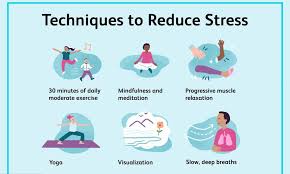Stress Management Techniques for Students School can be distressing, yet sit back and relax — I have a few straightforward tips to assist you with overseeing it like an ace.
Chapter by chapter guide
- Simple Pressure Busting Tips
- Managing School Pressure
- Regular Pressure Help
- Normal Wellsprings of Stress for Understudies
What School Life is Like
School can feel like a rollercoaster with all its highs and lows. From tests to companionships, it’s not unexpected to feel overpowered some of the time. Yet, knowing how to deal with pressure is really significant.
What Stress Means for You
Stress isn’t simply in your mind — it can screw with your body as well. Cerebral pains, feeling tired constantly, or in any event, feeling restless or miserable are signs that pressure may be getting to you. However, you can definitely relax, there are ways of managing it.
Simple Pressure Busting Tips
Deal with Yourself
Encourage time for stuff that makes you, such as taking a walk, playing your number one game, or spending time with companions. Dealing with yourself isn’t self centered — it resembles putting on your own breathing apparatus prior to helping other people.
Plan Your Time
Got too much going on? Break it into more modest pieces and make an arrangement. Utilize an organizer or your telephone to monitor tasks and cutoff times. Separating things causes them to feel less overpowering.
Managing School Pressure
Concentrate on Shrewd, Not Hard
Attempt different review stunts to see what turns out best for you. Cheat sheets, concentrate on gatherings, or even enjoying standard reprieves can make concentrating less upsetting. What’s more, recall, it’s alright to request help assuming that you’re stuck.Stress Management Techniques for Students
Try not to keep your pressure suppressed inside. Converse with somebody you trust — a companion, relative, or guide. Here and there sharing what’s at the forefront of your thoughts can have a major effect.
Ordinary Pressure Help
Sit down
At the point when stress begins to stack up, take a couple of full breaths or attempt a speedy unwinding exercise. Shut your eyes and imagine yourself in your cheerful spot — whether it’s at the ocean side or nestled into a decent book.
Live life to the fullest
Set aside a few minutes for things you appreciate, whether it’s drawing, playing sports, or paying attention to music. Doing stuff you love helps take your brain off pressure and offers you a genuinely necessary reprieve.
Normal Wellsprings of Stress for Understudies
Scholastic Tension: Elevated requirements to perform well scholastically, including keeping up with passing marks, fulfilling time constraints, and planning for tests, can be a huge wellspring of stress for understudies.
Using time productively: Adjusting coursework, tasks, extracurricular exercises, temporary positions, and social responsibilities can prompt sensations of overpower and stretch, particularly when time usage abilities are deficient.
Monetary Worries: Monetary concerns, for example, educational expenses, everyday costs, understudy loans, or the expense of course readings and supplies, can make critical pressure for understudies, especially those from low-pay foundations.
Social Connections: Peer pressure, struggle with companions or flat mates, dejection, pining to go home, or trouble acclimating to new friendly conditions can add to pressure among understudies.
Family Assumptions: Strain to meet family assumptions or satisfy parental yearnings for scholastic or profession achievement can be a wellspring of stress, particularly for understudies from societies with solid familial ties or scholarly customs.
Wellbeing Concerns: Actual medical problems, constant diseases, psychological well-being conditions (e.g., uneasiness, misery), or worries about private prosperity can fuel feelings of anxiety and effect scholastic execution.Stress Management Techniques for Students.
Execution Uneasiness: Apprehension about disappointment, hairsplitting, or an inability to acknowledge success can prompt execution nervousness and self-question, expanding feelings of anxiety and sabotaging certainty.
Changes and Changes: Changing in accordance with new conditions, for example, progressing from secondary school to school, moving to another city or nation, or adjusting to changes in living courses of action, can be distressing and trying for understudies.
Balance between serious and fun activities: Battling to track down a harmony between scholarly obligations and individual life, including mingling, side interests, taking care of oneself, and unwinding, can add to sensations of stress and burnout.
Vulnerability about What’s to come: Worries about vocation possibilities, work market intensity, graduate school applications, or vulnerability about likely arrangements after graduation can make pressure and nervousness about what’s in store.
Additionally Check: Read up Techniques for Understudies- End
Stress is essential for life, yet it doesn’t need to control you. With these simple tips, you’ll be better prepared to deal with anything school tosses your direction. Make sure to deal with yourself, request help when you really want it, and set aside a few minutes for the things that give you pleasure. You have this!
